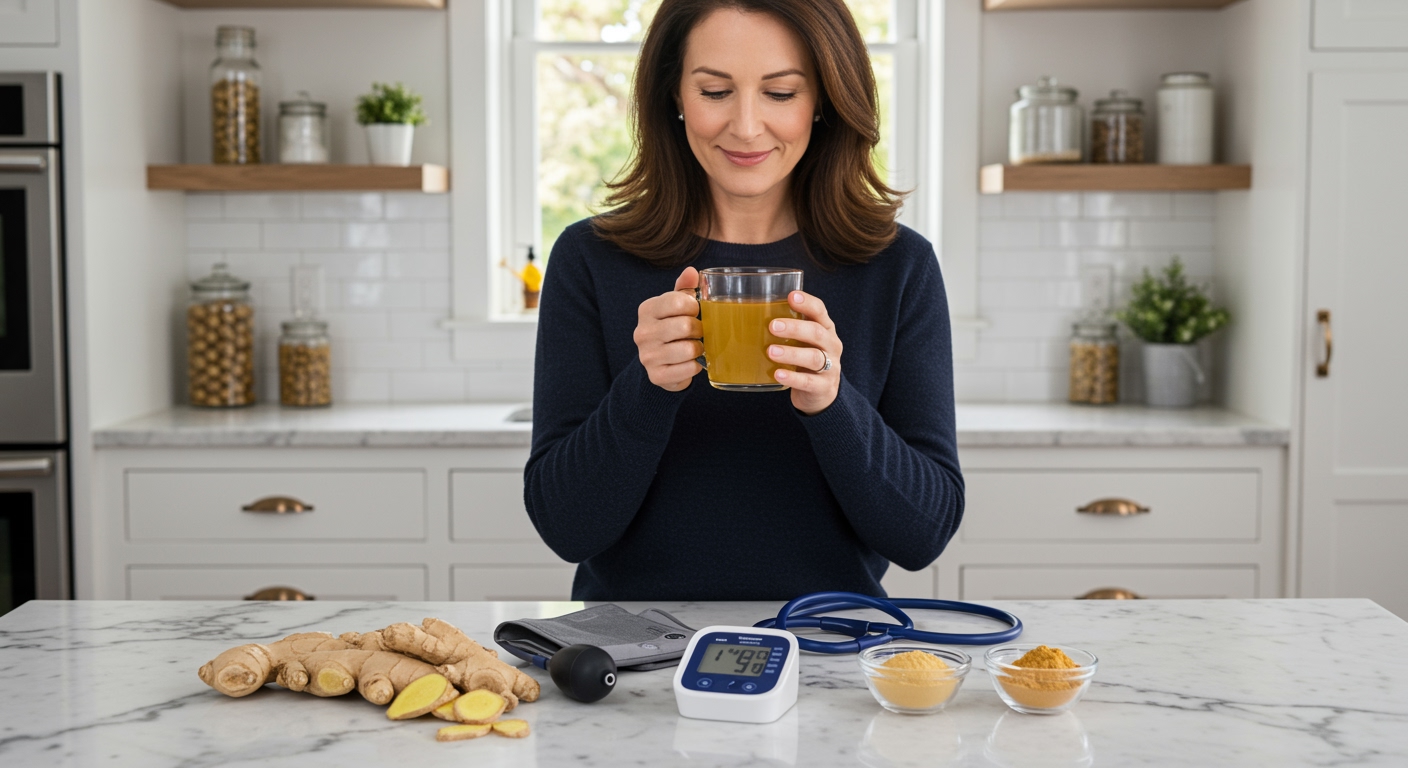✪ Key Takeaway: Ginger tea can lower blood pressure further in people with hypotension, potentially causing dizziness and weakness.
Introduction
Your morning cup of ginger tea might be doing more than warming you up.
Many people with low blood pressure wonder if this popular herbal remedy will help stabilize their numbers or make their symptoms worse.
Hi, I’m Abdur, your nutrition coach and today I’m going to explain exactly how ginger tea affects your blood pressure and whether you should include it in your daily routine.
How Does Ginger Tea Actually Affect Blood Pressure?
Ginger contains powerful bioactive compounds called gingerols and shogaols that directly impact your cardiovascular system.
These compounds work as natural vasodilators, which means they help relax and widen your blood vessels.
When your blood vessels dilate, blood flows more easily through them with less pressure against the vessel walls.
Research shows that ginger can reduce both systolic and diastolic blood pressure readings by blocking calcium channels in your heart and blood vessels.
This calcium channel blocking action prevents excessive contraction of your heart muscle and blood vessel walls.
For people with normal or high blood pressure, this effect can be beneficial and protective.
✪ Fact: Ginger can lower blood pressure by up to 6-8 mmHg in some individuals within 2-3 hours of consumption.
What Happens When You Have Low Blood Pressure?
Low blood pressure, also called hypotension, occurs when your blood pressure readings consistently fall below 90/60 mmHg.
Your body already struggles to maintain adequate blood flow to vital organs like your brain, heart, and kidneys when you have this condition.
Common symptoms include dizziness, lightheadedness, fatigue, nausea, and fainting spells.
These symptoms occur because your brain and other organs are not receiving enough oxygen-rich blood to function properly.
When you stand up quickly, you might experience orthostatic hypotension, where your blood pressure drops even further.
Your body needs adequate pressure to pump blood against gravity from your heart to your brain and other elevated organs.
✪ Note: Blood pressure below 90/60 mmHg is considered low and may require medical attention if symptoms are present.
Can Ginger Tea Make Low Blood Pressure Worse?
Yes, ginger tea can potentially worsen low blood pressure symptoms in people who already have hypotension.
Since ginger naturally lowers blood pressure through vasodilation, it can push your already low readings even lower.
This additional drop in blood pressure can intensify symptoms like dizziness, weakness, and fainting episodes.
The timing of consumption matters significantly because ginger’s blood pressure lowering effects peak within 2-3 hours after drinking the tea.
If you drink ginger tea on an empty stomach or during times when you typically experience low blood pressure symptoms, the effects may be more pronounced.
Some people report feeling more lightheaded or experiencing increased fatigue after consuming ginger tea regularly.
✪ Pro Tip: Monitor your blood pressure before and after drinking ginger tea to understand your individual response pattern.
Are There Any Potential Benefits For Hypotension?
While ginger tea primarily lowers blood pressure, it may offer some indirect benefits for people with hypotension.
Ginger can improve circulation by reducing blood viscosity and preventing blood from becoming too thick.
Better circulation means your heart doesn’t have to work as hard to pump blood through your vessels, even at lower pressures.
The anti-inflammatory properties of ginger may help reduce inflammation in blood vessels, potentially improving overall cardiovascular function.
Some people find that ginger tea helps with nausea and digestive issues that sometimes accompany low blood pressure episodes.
However, these potential benefits do not outweigh the risk of further lowering your blood pressure if you already have symptomatic hypotension.
✪ Fact: Ginger reduces blood viscosity by up to 12%, which can improve circulation but may not compensate for low pressure.
What Should You Do If You Have Low Blood Pressure?
If you have diagnosed low blood pressure, you should limit or avoid ginger tea consumption, especially during symptomatic periods.
Focus instead on natural ways to support healthy blood pressure levels through adequate hydration and proper electrolyte balance.
Increase your salt intake moderately under medical supervision, as sodium helps retain fluid and maintain blood volume.
Eat smaller, more frequent meals to prevent postprandial hypotension, which occurs when blood pressure drops after eating large meals.
Consider compression stockings to help prevent blood from pooling in your legs and improve circulation back to your heart.
If you want to continue drinking ginger tea occasionally, start with very small amounts and monitor your symptoms carefully.
✪ Pro Tip: Keep a blood pressure log to track how different foods and beverages affect your readings throughout the day.
The Bottom Line
Ginger tea can worsen low blood pressure by further reducing your already low readings through natural vasodilation effects.
When your blood pressure is already low, adding more pressure-lowering substances is like trying to fill a leaky bucket with a smaller hose.
I would love to hear about your experiences with ginger tea and blood pressure in the comments below, and please share any questions you might have about managing hypotension naturally.
References
At NutritionCrown, we use quality and credible sources to ensure our content is accurate and trustworthy. Below are the sources referenced in creating this article:
- PubMed: Ginger and cardiovascular effects
- PubMed: Blood pressure lowering effects of ginger
- Medical News Today: Ginger tea side effects
- Nature Med Clinic: Ginger and heart health





